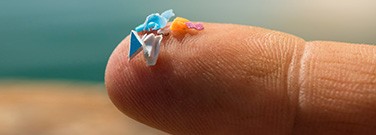Is There Plastic in Our Blood?

By Mark Miller
According to a report in Smithsonian Magazine, there very well could be.
A study from the Vrije Universiteit Amsterdam discovered microplastics — tiny plastic particles — in the blood of about 77 percent of its participants. “Our study is the first indication that we have polymer particles in our blood — it’s a breakthrough result,” said ecotoxicologist and one of the study’s coauthors, Dick Vethaak, PhD, in the report.
Cause for Concern
It’s not too surprising that plastic has found its way into our bodies. It’s in the foods we eat and the water we drink. An article about the study in Science News for Students states that we may also inhale microscopic plastic floating in the air.
But eating and inhaling plastic doesn’t mean it has technically become part of our bodies. That only happens if it enters our bloodstream, according to Science News for Students. And that’s what makes the discovery troubling. If microplastics are circulating in our blood, who knows where they might go or what harm they might do?
“It is certainly reasonable to be concerned,” Dr. Vethaak said in Smithsonian Magazine. “The particles are there and are transported throughout the body.”
Getting Small
To find the microplastics, Dr. Vethaak and the research team used chemicals to process blood samples collected from 22 adults. They filtered out the larger cells and performed further filtration on the liquid (plasma). The additional filtration eliminated any particles larger than 700 nanometers, 100 times smaller than the width of a human hair.
From there, they searched for molecules that make up plastics called polymers. Measurable amounts of four types were found in 17 of the samples: polyethylene, polyethylene terephthalate or PET, polystyrene, and polymethyl methacrylate or PMMA.
Polyethylene terephthalate was the most commonly found — in about half of the participants — and polymethyl methacrylate the least — uncovered in only one of the samples.
Possible Health Impacts
We now know that some human bloodstreams contain microplastics, but not much has been determined about what the effects might be.
Environmental health specialist at Memorial University in Newfoundland, Canada, Atanu Sarkar, PhD, said in the Science News for Students article that “microplastic can cause inflammation,” and that “these toxic chemicals can affect our hormonal and reproductive system.” Microplastics can also harm animals and ecosystems, the article said.
For Dr. Vethaak and his fellow ecotoxicologists, the plan is to expand their research by searching for additional types of polymers and increasing the sample size.
Discussion Questions
- What are polymers?
- What functions does our blood perform?
- What do ecotoxicologists do?